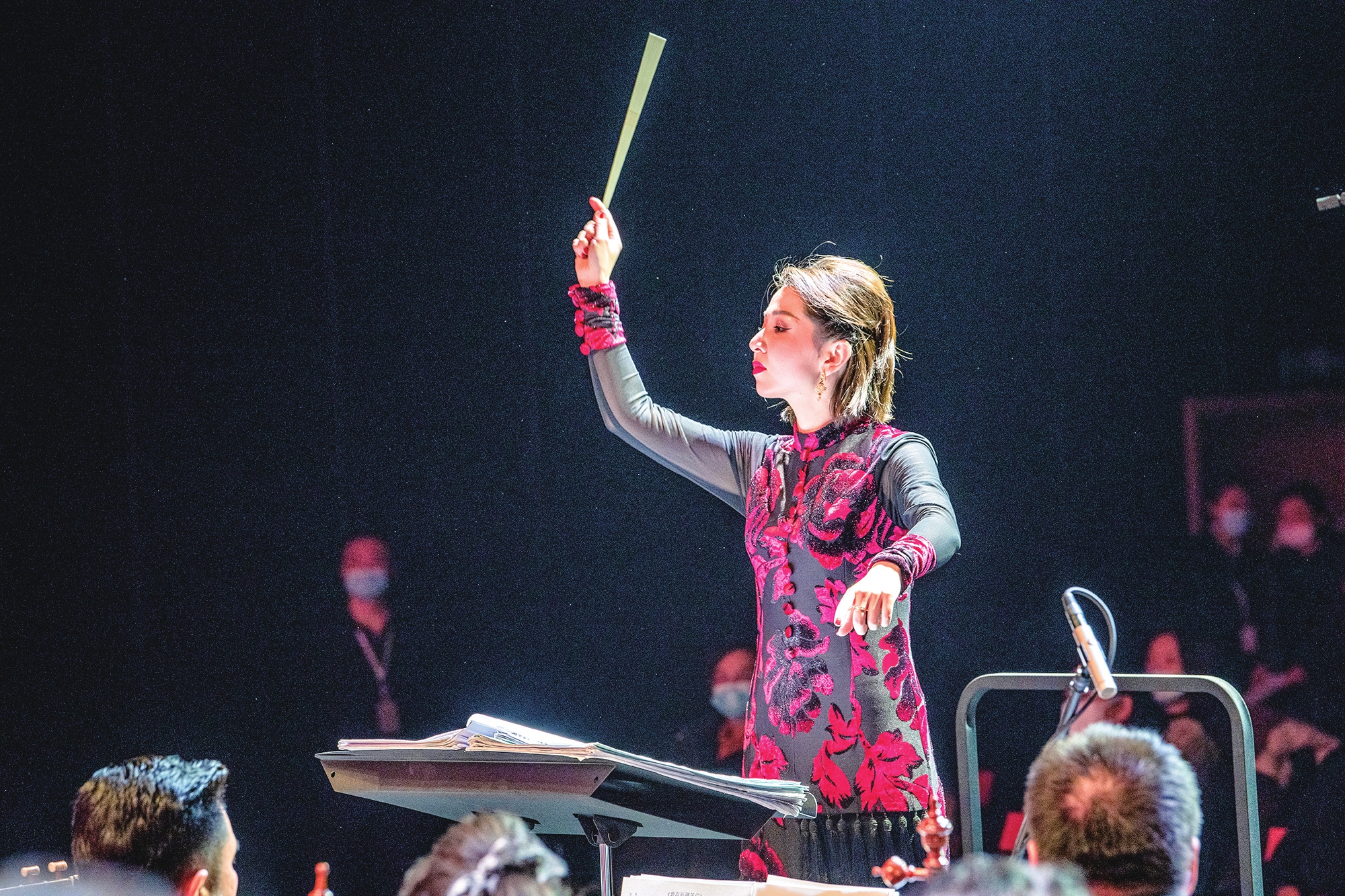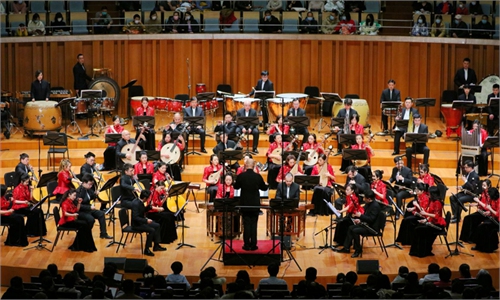ARTS / THEATER
A bridge connecting the world
Young conductor wishes to bring Xinjiang folk music to the Musikverein in Vienna

Nuerbana Yiming conducts during a concert with Xinjiang Art Theater's folk orchestra. Photo: Courtesy of Nuerbana Yiming
Wearing a traditional Chinese qipao with folk elements on the dress, conductor Nuerbana Yiming's joint performance with the folk orchestra from the Xinjiang Art Theater has won a round of thunderous applause from the seats at the Chinese Lunar New Year concert in Urumqi, Northwest China's Xinjiang Uygur Autonomous Region.
The 35-year-old performer from Xinjiang, often known as Bana by most of her friends and colleagues, is the only female conductor at the Xinjiang Art Theater so far.
Bana has a deep and all-around understanding toward her role here in the theater: She considers herself as a bridge connecting professions, Xinjiang folk music, modern instruments and the world.
"My job is to integrate all the music knowledge and the concepts I've learned abroad into every performance of our folk orchestra," she told the Global Times in a recent interview.
"But more importantly, I wish we can produce more works in the future and to bring our performances to the Musikverein concert hall in Vienna so that people around the world can get to know the charm of Xinjiang's folk music," she added.
'No heading back'
Though already over a decade ago, the young conductor still remembers her fist time as a conductor waving the baton at the center of the stage. She described the experience as "stressful and scary."
"It could have gone all wrong and I got cold feet by only thinking about my potential failure," Bana recalled.
Her first show as a conductor was in 2008 in a small concert hall in Uzbekistan, where she received both of her undergraduate and graduate degrees.
"There were over 70 performers on the stage. I remember when the countdown started, I grabbed my teacher's hands and started trembling. My teacher was a harsh and serious people, who told me to embrace the challenges ahead with braveness. 'There is only success and no failure,' he would say."
Bana's passion for music came from her family: Her father was a clarinetist and under her family's influence she started her violin and piano training when she was 8 years old.
In 2004, she was admitted into The State Conservatory of Uzbekistan to study as a conductor. But the curiosity to be a foreigner in another country was soon replaced by the language barrier and the stressful studies.
"Everyday I carried thousands pages of music sheets from my dorm to the classroom and I needed to memorize them in a really short time," she recalled. "Sometimes I questioned myself and wondered if it was better for me to be a street vendor."
But all her efforts paid off in the end. Before her graduation in 2009, she received the offer from the Xinjiang Art Theater. It was at the very beginning when the theater's folk orchestra was established and few works had been created by the orchestra.
"I came back because for me all my musical talent and inspiration come from my hometown," said the Xinjiang conductor.
"Now I memorize all the sheet music of all 70 members in the orchestra, before we start a concert."
Open minded
The Xinjiang Art Theater's folk orchestra is mainly composed of musical instruments played by Xinjiang's ethnic minorities, and the instruments combine the folk musical instruments such as rewap, dutar, satar, gijak and cello from the Western music system.
However, for this orchestra, every new performance is an experiment for them.
Unlike other orchestras who play world classics following the performances of their predecessors, the Xinjiang Art Theater's folk orchestra's mission has been turning Xinjiang's folk music into a symphony form, which they didn't have too many references for.
"And this is our biggest challenge when composing a new work as a team," Bana noted.
Bana told the Global Times that so far there is still relatively few information available on Xinjiang folk music.
"To integrate the symphony into the traditional music we've invited the top Xinjiang folk music masters to work with us and they have helped us make adaptations," she said.
"From them we learned different characteristics of Xinjiang ethnic musical instruments, and we have created quite a few pieces in the past 13 years and I'm proud of that."
As a conjuncture of the ancient Silk Road, Xinjiang's fused culture has clearly reflected on its music with constant developments in its music style combining local, Arabic and Persian music, as well as other forms from all over the world.
"And now we combine the music with a western orchestra, trying at the same time to keep the folk part of it," Bana said.
The orchestra's next mission is to bring their works to an international stage.
In 1998, the China National Traditional Orchestra brought traditional Chinese music in the Musikverein for the first time, followed by the folk symphony Uygur Tone Poem in 2001.
"And this is our future goal too. It's my dream to perform there with the folk orchestra so that music lovers from all over the world can get to know Xinjiang. We want Xinjiang's thousands of years of music to develop with the times and that needs to be achieved with open minds and widened eyes," said the conductor.

